Unit 4 Body language(vocabulary)
单元讲解必修四unit4 body language

单元讲解必修四unit4 bodylanguage课本单元讲解(含课文音频):必修四Unit4 Body language_doctor今天,要和大家分享的是人教版必修四Unit4常考单词、高频短语和写作句式,并附有课文音频学起来哦!Unit4 Body language常考单词、高频短语和写作句式Ⅰ. 常考单词必背1.statementn. 陈述;说明His statement is pletely untrue.他的话完全是在撒谎。
2.greetvi.&vt. 迎接;问候I greeted her with a smile.我笑着向她致意。
(1)greet sb with... 用……迎接……;用……向某人打招呼(2)greeting n. (常用复数形式) 问候;祝贺;贺词3.representvt. 代表;象征In the western countries,V often represents victory.在西方国家,V常象征着胜利。
He represented himself as a doctor.他自称是一个医生。
[快速闪记](1)represent sth to sb 向某人说明某事,向某人传达某事represent...as... 把……描绘成……represent oneself as/to be... 自称是……(2)representative n. 代表4.curiousadj. 好奇的The children were curious to know what was happening over there.孩子们很想知道那边发生了什么事。
[快速闪记](1)be curious about 对(某事物)感到好奇be curious to do... 很想做某事;渴望做某事(2)curiously adv. 好奇地5.approachvt..&vi.接近;靠近;走近 n. 接近;方法;途径As summer approached,the weather became hotter and hotter.随着夏天的临近,天气越来越热。
Unit 4 Body Language 单词默写-高中英语人教版(2019)选择性必修第一册

Unit 4 Body languageDAY1(教材P109: interaction-P110:reliable)1. n.交流﹔相互影响2. vi.( 根据情况)变化﹔改变3. adj.合适的﹔恰当的4. 相比之下5. vi.赞成﹔同意vt.批准﹔通过6. vt.表现﹔表达﹔说明﹔证明7. n.手势﹔姿势﹔姿态8. vt.当场看到﹔目击﹔见证n.目击者﹔证人9. vt.使用﹔应用﹔雇用10. adj.相同的11. v.把……理解(解释)为vi.&vt.口译12. vi.相异﹔不同于13. (与)相比较14. n.面颊﹔脸颊15. vt.较喜欢﹔选择﹔有利于n.帮助﹔恩惠﹔赞同16. vi.鞠躬﹔点头vt.低(头) n.弓﹔蝴蝶结17. n.腰﹔腰部18. 推理﹔推断19. 消除﹔分解﹔打破20. n.隔阂﹔障碍21. adj.假装的﹔假的﹔冒充的22.n.愤怒﹔怒气vt.使生气﹔激怒23.adj.可靠的﹔可信赖的DAY2(教材P110: incident-P110:occupy)1. n.发生的事情;严重事件;冲突2. n.&vt.审讯;审判;试验;试用3 adj.轻微的;略微的;细小的* adv.略微地;稍微地4. adj.双胞胎之一的;孪生之一的n.孪生之一;双胞胎之一5. adj.不涉及言语的;非言语的6. n.评价;评定7. vt.评估;评价8. adj.内部的;里面的9. 直起来;整理;收拾整齐10. vi.垂头弯腰地走(或坐等)11. n.故作姿态;(为画像、拍照等摆的)姿势vi.摆好姿势vt.造成(威胁、问题等)12. vt.&vi.( , )(使)弯曲;倾斜;偏向13. vt.揭示;显示;露出14. vt.使更清晰易懂;阐明;澄清15. 换句话说;也就是说16. n.教师;教育工作者;教育家17. vt.给(试卷、问题等)打钩号vi.(钟表)发出嘀嗒声n.钩号18. n.趋势;倾向19. vt.放低;降低;减少adj.下面的;下方的;较小的20. vt.意味着;暗示21. adv.几乎不;勉强才能; 刚刚22. n.下巴23. vt.占据;占用DAY3(教材P110:stare-tone)1.vi.着看;凝视n.凝视2.n.天花板﹔上限3. vt.分散(注意力) ﹔使分心4. vt.察觉﹔看待﹔理解5. vi.&vt.区分﹔辨别6. n.焦虑﹔担心﹔害怕7. n.胸部﹔胸膛8. adj.难堪的﹔尴尬的9. adj.羞愧﹔惭愧10. adv.只是﹔仅仅﹔只不过11. (短暂地) 访问﹔要求(某人讲话等)﹔正式邀请12. vi.&vt.费心﹔麻烦﹔因…操心n.麻烦﹔不便13. vi.&vt.哭泣﹔流泪14. 有某种影响﹔在工作15. n.矛盾冲突vi.冲突﹔抵触16. (= )vi.&vt.询问﹔打听17. adv.最终﹔最后18. vt.调整;调节vi.&vt. 适应﹔(使)习惯19. vi.干预﹔介人20. vi.( 对) 起反应﹔回应﹔(对食物等)有不良反应21. n.组成部分﹔零件22. n.语气﹔腔调﹔口吻DAY4Group1 名词1. n.愤怒﹔怒气vt.使生气﹔激怒2. n.焦虑﹔担心﹔害怕3. n.评价﹔评定4. n.隔阂﹔障碍5. n.麻烦﹔不便6. n.弓﹔蝴蝶结7. n.天花板﹔上限8. n.面颊﹔脸颊9. n.胸部﹔胸膛10. n.下巴11. n.组成部分﹔零件12. n.矛盾冲突vi.冲突﹔抵触13. n.教师﹔教育工作者﹔教育家14. n.帮助﹔恩惠﹔赞同15. n.手势﹔姿势﹔姿态16. n.发生的事情﹔严重事件﹔冲突17. n.交流﹔相互影响18. n.故作姿态﹔(为画像、拍照等摆的)姿势19. n.趋势﹔倾向20. n.钩号21. n.语气﹔腔调﹔口吻22. n.审讯﹔审判﹔试验﹔试用23. n.孪生之一﹔双胞胎之一24. n.腰﹔腰部25. n.目击者﹔证人Group2 动词1. vt.调整﹔调节vi.&vt. 适应﹔(使)习惯2. vi.赞成﹔同意vt.批准﹔通过3. vt.评估﹔评价4. vt.&vi.( , )(使)弯曲﹔倾斜﹔偏向5. vi.&vt.费心﹔麻烦﹔因…操心6. vi.鞠躬﹔点头vt.低(头)7. n.面颊﹔脸颊8. vt.使更清晰易懂﹔阐明﹔澄清9. vi.冲突﹔抵触10. vt.表现﹔表达﹔说明﹔证明11. vi.&vt.区分﹔辨别12. vt.分散(注意力)﹔使分心13. vt.使用﹔应用﹔雇用14. vt.较喜欢﹔选择﹔有利于15. vt.意味着﹔暗示16. ( = )vi. &vt.询问﹔打听17. vt.把…… 理解(解释)为vi.&vt.口译18. vi.干预﹔介人19. vt.放低﹔降低﹔减少20. vt.占据﹔占用21. vt.察觉﹔看待﹔理解22. vi.摆好姿势vt.造成(威胁、问题等)23. vi.( 对) 起反应﹔回应﹔(对食物等)有不良反应24. vt.揭示﹔显示﹔露出25. vi.垂头弯腰地走(或坐等)26. vi.着看﹔凝视n.凝27. vt.给(试卷、问题等)打钩号vi.(钟表)发出嘀嗒声28. vt.审讯;审判;试验;试用29. vi.(根据情况)变化;改变30. vi.&vt.哭泣;流泪31. vt.当场看到;目击;见证n.目击者;证人Group3 形容词和副词1. adj.合适的;恰当的2. adj.羞愧;惭愧3. adj.下面的;下方的;较小的4.adv.几乎不;勉强才能; 刚刚5. adj.难堪的;尴尬的6. adj.假装的;假的;冒充的7. adj.相同的8. adj.内部的;里面的9. adv.只是;仅仅;只不过10. adj.不涉及言语的;非言语的11. adj.可靠的;可信赖的12. adj.轻微的;略微的;细小的adv.略微;稍微13. adj.双胞胎之一的;孪生之一的14. adv.最终;最后Group4 核心词块1. 似乎;好像;仿佛2. 急救箱3. 严重受损;破败不堪4. 震惊;吃惊5. 露天;在户外6. 现有(尤指帮助)7. 消灭;彻底消除。
Unit 4 Body Language 词汇知识点课件 高二英语(人教2019版选择性必修第一册)
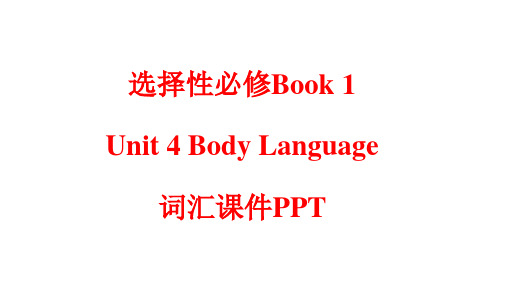
.call on
• ①拜访(某人) • ②号召;要求
•n
• [C]目击者;见证人;证人
• be (a) witness to ...是...的目击者;是...的见证人
• vt
• 目击;亲眼所见
.employ
• vt
• ①雇用;聘请
• employ sb to do sth雇佣/聘请某人做某事
• ②[正式用语]使用;利用
• be employed in doing sth忙于做某事
• 内部的;体内的;内心的
.straighten up
• 起来;整理;收拾整齐
• 【拓展】
• straight
• adj①(笔)直的; 平直的②整齐的;端正的③正直的;诚实的④纯粹的
• get sth straight [口语]弄清楚某事
• adv①笔直地;成直线地②直接;立即③连续地
• straight away / off立即;马上
.distract
• vt
• 分散(注意力);使分心
• 【同根词】
• distracted adj.注意力分散的;思想不集中的
.perceive
• vt
• [正式用语]察觉;发觉;看待;理解
.distinguish
•v
• ①vi&vt区别;辨认;使有别于 • ②vt使杰出;使显出特色
• 【同根词】
• 【同根词】
• bare adj ①赤裸的;光秃秃的;空的 ②仅有的;最基本的
.chin
• n.
• 下巴,下颌
.occupy
• vt
• ①占领;占据 • ②占用/占去(时间、空间) (take up) • ③使忙碌
高一英语必修四:Unit+4+Body+language+全单元+

Unit 4 Body LanguageI. Teaching aims and demands 教学目标和要求:1.Topics 话题Talk about body language2.Function: 交际功能提供和请求帮助(Making offers and requests)Can/Shall I help you with that? Could you help me with...? Would you like me to...?Do you need some help with that? Could you please...? No,thank you.Thanks for all your help. Would you like some help? No,thanks.I can manage it myself. Could you give me a hand with this? That's very nice of you. Is there anything else I can do for you?3.Vocabulary 重点词汇和短语unfair; customer; avoid; suitcase; ahead; manage; fold; vary; crazy; part; firm; handshake; bow; fist; bend; tap; gently; anger; useless; occur; focus; specific ahead of; give sb a hand; get through; tear down ;hold up; make a face; in order4.Grammar:语法动词-ing形式作主语、宾语和表语(2)1.用英语表达‘做某事如何的’---动词-ing形式作主语2.有些及物动词后面需跟动词-ing形式作宾语3.绝大多数介词后面需跟动词-ing形式作宾语4.用英语表达'什么事是某事' ---动词-ing形式作表语II. Difficult pointsIII. Main teaching aids教具:A tape-recorder; Multimedia, projector, role cardsⅣ. Main teaching methods 教法:1. The interaction between the teacher and the students, and among the students themselves; Attention to the students’ listening, speaking, reading and writing; and so on.2. Listening-and–answering activity to help the students go through with the listening material.3. Use both individual work and group or pair work to make every student work and think in class V. Teaching procedure:Period 1第一节(一)明确目标1. Learn body language. Warming up to arouse the students love in talking.2. Do some listening to improve the students listening ability.3. Making simple dialogues to train the students speaking ability.(二) 整体感知Step 1 PresentationAsk some students to the front and act out the correct emotions.2. Ask students to make a dialogue in pairs using body language.(三)教学过程Step 2 Warming upGo through warming up and make sure the students understand it and can match each picture with the correct emotion and the correct sentence.Answers (From left to right):1 Picture 1: Confused I don't know what to do.2: Angry I can't believe she said that! That is so unfair!3: Sad I've lost my wallet!4: Happy I got an A in my exam!5: Tired It's been a long day. I can't keep my eyes open.2 Various answers are possible but explanations for choices should refer to details in the pictures.3 Various answers are possible.Step 3 Listening comprehensionNow let s have some listening training.LISTENING TEXT:Part 1Which of the following is a form of communication?A Speaking to someone.B Standing in a comer at a party with your arms crossed.C Avoiding eye contact with the salesman when you are buying something.D All of the above.Speaking, or using language to communicate, is probably the best known form of communication. However, the body language used in answer B and the lack of eye.contact in answer C can say as much or more as speech.Let's take a closer look at answer B. You are at a party and see your friend Tom standing alone in a comer with his arms crossed. When you ask him if he is enjoying the party, he says, "Yes, I'm having a great time." Do you believe him? Probably not, because his body language is telling you that he doesn't like being there. If someone asks you later whether you think Tom liked the party, you might say "He said he enjoyed it, but it didn't look like it."Now let's look at C. Imagine that you are a salesman at a store. You always greet your customers with a smile and then talk for a while. But what if one of your customers avoids making eye contact with you? Do you still speak to her? Probably not. By not looking at you, she has told you that she doesn't want to talk to you.Part 2Body language can help you decide whether a person is telling the truth or not. If a person covers his or her mouth with his or her hand, or if he or she puts his / her finger over his / her mouth, he or she may be lying. If the person you are talking to touches his or her ears or neck, this is also a sign that he or she may not be telling you the truth. How can you tell if the person you are talking to is interested in what you are saying? Watching his or her body language will give you a goodidea. Someone who is interested will lean forward in their seat and will look at you when you are speaking. They may also nod their head to show that they are listening and agree with what you are saying.1 Answers to Part 1 : ID 2B 3AAnswers to Part 2: IB 2B2 Answers will vary but here are a few appropriate ways to communicate each feeling using body language.Enjoying sthsmiling, opening eyes wide, rocking one's head from side to sideLiking someonesmiling, hugging oneself, leaning one's head to one side, lowering with one's eyes, leaning forward or closerInterested in sthstaring a lot, putting a hand 10 your chin as in thought, leaning forward, opening eyes wide, shaping your mouth with a big 0, responding with the same expressions as the person who you're listening toDisagreementlooking away, putting one's head down into one's arms, talking to oneself, whistling, frowning, folding one's armsNot enjoying sthyawning, sighing, complaining, frowning, looking awayIn a hurrysighing, biting down with one's teeth, not standing still, tapping one's toes on the floor, looking toward the doorNot interestedsame as not enjoyingWanting to talk to othersraising one's hand to be called on, trying to speak up, waving one's arms over one's head to }&et attention, jumping up and down, shaping one's mouth in a big 0Step 4 Speaking practiceSituation 1: An old man is carrying a very heavy suitcase.Asking for help(0 = Old man; P = Paul)0: Excuse me, young man. Could you give me a hand with this, please? It's very heavy.P: Oh, of course, I'd be happy to. There we go.0: Thank you.P: You're welcome.0: Oh my, this is heavy. Excuse me, sir, could you help me with this bag?P: Certainly. Where should I put it?0: Thank you. Just put it over there, please.P: There you are.0: Thank you, that's very nice of you.P: Dh, not at all.Offering helpP: That bag looks very heavy. Do you need some help with that?0: Oh, thank you. Could you please put it over there? P: No problem. There you are. Is there anything else I can do for you?0: No, thank you. Thanks for all your help.P: Woultl you like some help?0: Oh, yes, please. This bag is simply too heavy for me. Could you give me a hand with it?P: Sure. My, this bag is heavy! Ah, there we go. Where shall I put it'?0: Over there, please. Thank you so much!P: You're welcome.Situation.2:..Someone is late for a flight and wants to go ahead of the queue.(J = Jim; A = Passenger A; B = Passenger B)J: Excuse me, but I'm late for my flight. Could I please go ahead of you?A: Why sure. My flight doesn't leave for another hour. Are these bags yours? Shall I help you with that?J: No, thanks. I can manage it myself. (To the passenger standing at the check-in counter.) Hi. May I cutin front of you? I don't want to miss my plane.B: Go right ahead. I'm still looking for my ticket. Do you need some help with that bag?J: Yes. Could you please help me put it up here? Thank you.B: You're welcome.J: Oh no! I'm late for my flight.A: Excuse me, but did you say that you were late? Would you like to-go ahead of me? My flight doesn't leave for another hour.J: Thank you, that's very nice of you! Could you helpme with this bag, please?A: Sure. There you are. Would you like me to bring it up to the counter?J: Oh, no, thank you. I can manage it myself now.Situation 3: An old and sick person is on a crowded bus and wants to sit down.(0 = Old person; P = Passenger)0: Oh my, this bus is crowded. Excuse me, could you please help me with this bag?P: Certainly. There you are. Here, please take my seat, you look a bit tired.0: Thank you. Yes, I'm not feeling well today. I think I have a bit of a cold. Could you please tell me when we reach Long Street? I'm afraid I can't see where we are when the bus is this crowded.P: Sure. I'll let you know when we get there.P: Shall I help you with that?0: No thanks. I can manage it myself. But could you please let me sit down for a while? I'm not feeling well.P: Oh, of course. Please take my seat.0: Thank you. That's very nice of you.P: Not at all.(四)总结扩展Step 5 Necessary language pointsToday we ve done some listening and speaking, and learn how to give advice and some everyday English used between doctors and patients.Listening and speaking听说要点1>What if a customer avoids making eye contact with you?What if ...? [用法]假使...呢?;若是...又怎么样?[举例]What if he doesn't come (What shall we do if he doesn't com)? 如果他不来,我们怎么办呢?What if it's true (Even if it's true, does it mattere)? 即使这是真的,又有什么关系吗? avoid [用法]vt. 避免[举例]They all avoided mentioning that name. 他们都避免提及那名字。
重点短语(必修 4 Unit 4 Body language)(讲义)
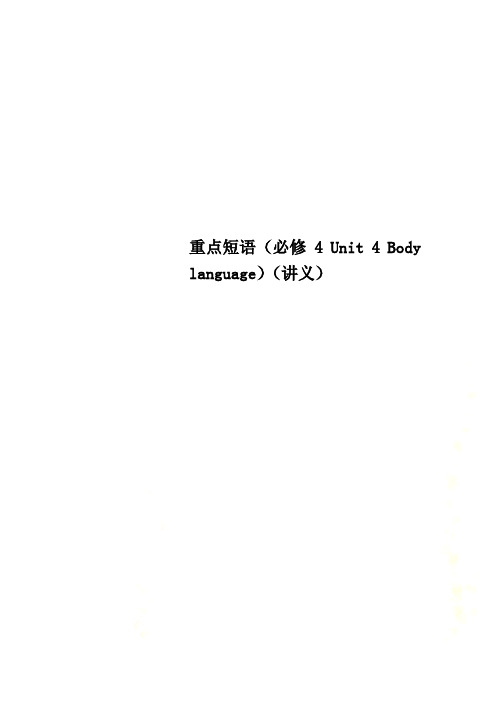
重点短语(必修 4 Unit 4 Body language)(讲义)高中英语重点短语(必修 4 Unit 4 Body language)1. 学习短语的基本含义和用法。
2. 灵活运用所学的短语,学会用短语造句。
重点:短语at ease, in general, lose face, in most cases的用法。
难点:与face有关的短语和case的相关用法。
【短语学习】1. at ease舒适;快活;自由自在(相当于comfortably)with ease轻易地,毫不费力地(相当于easily)feel/look at ease 感到/看上去轻松自在put/set sb. at ease 使某人感到轻松自在take one’s ease 休息,放松一下stand at ease (口令)稍息When you feel nervous, you’d better listen to some light music to put yourself at ease.当你感到紧张时,你最好听些轻音乐使自己放松一下。
I never feel completely at ease with him.我跟他在一起总感到不是很自在。
Don’t overwork yourself and take your ease.不要过度劳累,休息一会儿。
The most universal facial expression is,of course,the smile—its function is to showIn general, though, studying international customs can certainly help avoid difficulties in today’s world of cultural crossroads!总的来说,在当今文化交融的世界里,学习不同国家的习俗肯定能够帮助我们避免交往中的困难!Her English pronunciation is not so bad in general.她的英语发音一般来说是不错的。
人教必修四Unit4-Body-language-词汇要点讲解
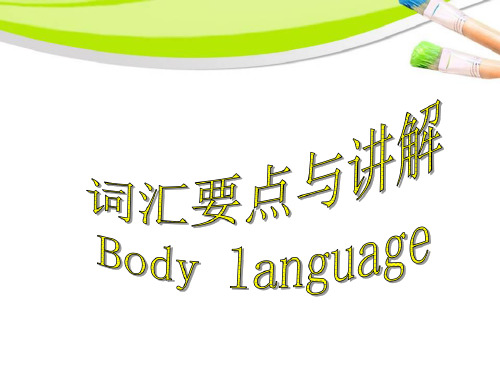
(3)面对困难时,他们从不放弃而是努力寻找出路。
F_a_c_e_d_w_i_th_d_i_ff_ic_u_l_ti_es___,_they never give up but try their best to find a way out.
司机看错了一个重要的信号。
• I'm afraid you completely misread the situation. 恐怕你完全看错了形势。
• 3 facial 脸部的,面部的 • facial expression 面部表情 • facial tissues 面巾纸 • facial painting 脸谱 • facial cream 美容霜
ease. 他递给她一杯咖啡,让她放松下来。
with ease=easily轻易地
At ease ! 稍息!
10.lose face 丢脸;失面子 lose face with sb在…面前丢脸
lose heart 泄气,灰心 ; lose one’s heart to…爱上…
(1)save one's face
• 5 function n.作用,功能,职能 v.起作用
• The function of the government is to serve the people.
• 政府的职能是为人民服务。 • The sofa can also function as a bed.
这沙发也可以当床。
• Some English nouns function as verbs.
她从椅子上跳起来迎接她父亲。 greet sb with (a smile)用…向…问候 greeting(s) n.
新课标人教版必修四Book4 Unit4 Vocabulary2

• • • • • • • • • • • • • • • • •
I. 重点词语识读 1.statement n.__________ 2. greet vi. & vt. ________ 3.represent vt. ________4. association n. ___ 5.dormitory n. _______6.canteen n.______ 7. flight n._________ 8.curious adj._____ curiously adv. ______ 9.approach vt. & vi. _______ n. ________ 10. cheek n. ______ 11. defend vt. _______ defence n. _______12. major adj. _____ 13.misunderstand vt. (misunderstood, misunderstood)_____ misunderstanding n.____14.dash vi._____15.adult n. _______adj. ____ 16.△simply adv. _______17.spoken adj. _______unspoken adj. ______ 18. posture n. _______19. Spain n. _______20.Italy n. ________ 21. likely adj. _______22. crossroads n.________23. employee n. ____ 24.frown vi. ______ 25.fist n_______26. yawn vi. _______ 27. respectful adj. ________28. subjective adj. ________ 29. hug vi. & vt._______30.rank n. _____31.cassette n._______ 32. defend …against_____33.be likely to _____34.in general ________ 35.lose face ________ 36. turn one ‘s back to _____
(人教版)选择性必修第一册:UNIT 4 BODY LANGUAGE(含解析)
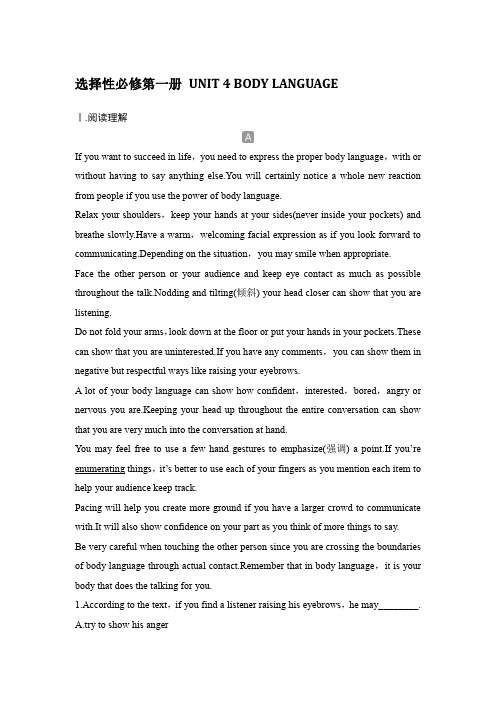
选择性必修第一册UNIT 4 BODY LANGUAGEⅠ.阅读理解If you want to succeed in life,you need to express the proper body language,with or without having to say anything else.You will certainly notice a whole new reaction from people if you use the power of body language.Relax your shoulders,keep your hands at your sides(never inside your pockets) and breathe slowly.Have a warm,welcoming facial expression as if you look forward to communicating.Depending on the situation,you may smile when appropriate.Face the other person or your audience and keep eye contact as much as possible throughout the talk.Nodding and tilting(倾斜) your head closer can show that you are listening.Do not fold your arms,look down at the floor or put your hands in your pockets.These can show that you are uninterested.If you have any comments,you can show them in negative but respectful ways like raising your eyebrows.A lot of your body language can show how confident,interested,bored,angry or nervous you are.Keeping your head up throughout the entire conversation can show that you are very much into the conversation at hand.You may feel free to use a few hand gestures to emphasize(强调) a point.If you’re enumerating things,it’s better to use each of your fingers as you mention each item to help your audience keep track.Pacing will help you create more ground if you have a larger crowd to communicate with.It will also show confidence on your part as you think of more things to say.Be very careful when touching the other person since you are crossing the boundaries of body language through actual contact.Remember that in body language,it is your body that does the talking for you.1.According to the text,if you find a listener raising his eyebrows,he may________.A.try to show his angerB.want to give his own opinionC.not understand what you sayD.want to prove his confidence2.The underlined word “enumerating” in paragraph 6 may mean “________”.A.consideringB.judgingC.numberingD.discussing3.What’s the author’s suggestion if you have a larger crowd to communicate with?A.To walk at a slow pace.B.To shake hands with every person.C.To look down at the floor.D.To fold your arms.4.What is the most suitable title for the text?A.The Power of Body LanguageB.The Attraction of Body LanguageC.The Origin of Body LanguageD.The Understanding of Body LanguageA simple gesture can be formed into a child’s memory so quickly that it will cause the child to give a false answer to a question accompanied by that gesture.A new finding suggests that parents,social workers,psychologists and lawyers should be careful with their hands as well as their words.Gestures can be as informative as speech,but hand gestures are so common that we rarely notice we’re using them.While the recall of both adults and children are easy to react to suggestion,the memories of children are known to be particularly influenced,said lead researcher Sara Broaders of Northwestern University.Kids are used to looking to adults to tell events for them and can be misled even if not intentionally(有意地).Previous research,for example,has shown that detail-loaded questions often cause false answers; when asked,say “Did you drink juice at the picnic?” the child is likely to say “yes” even if no juice had been available.It is not that the child isconsciously lying,but rather the detail is quickly formed into his or her memory.To avoid this problem,social workers have long been advised to ask children only open-ended questions,such as“What did you have at the picnic?”But an open-ended question paired with a gesture,briefly meaning a juice box,is treated like a detailed question.That is,children become likely to answer falsely.And it isn’t just a few kids: 77% of children gave at least one piece of false information when a detail was suggested by an ordinary gesture.Gestures may also become more popular when talking with non-fluent language users,such as little kids,Broaders said as hand movements can impart meaning of unfamiliar words and phrases.“It certainly seems reasonable that adults would gesture more with children.”In general,Broaders advises parents and other adults to“Try to be aware of your hands when questioning a child about an event.Otherwise,you might be getting answers that don’t reflect what actually happened.”5.What do we know about gestures according to the text?A.They have a certain effect on children.B.They are rarely used by people.C.They have no function at all.D.They are often used by social workers.6.Why are kids easy to be misled by gestures according to Sara Broaders?A.These gestures are very attractive.B.Their memories are affected easily.C.Children are easy to tell lies.D.These gestures are used frequently.7.What does the underlined word “impart” in paragraph 6 mean?A.Separate.B.Tell apart.C.Confuse.D.Pass on.8.Which of the following can be the best title for the text?A.Gestures—A Useful Way of EducationB.Gestures Can Mislead ChildrenC.Gestures Mean Adult’s DirectionsD.Gestures Affect Children LittleⅡ.完形填空Do you listen?Do you really listen?Is there more to listening than just hearing? Listening is,by far,one of the most important aspects of communication.So often,you pay attention to your way of speaking,your __1__,your dialect,but neglect your ability to listen.It is my __2__ that people scream out or change the intended purposes of much of what they hear.Too often,we consider listening the __3__ part of conversation,although it requires our focus,purpose,and active participation.Listening means to give ear to,to pay attention to,to __4__,to witness,to hear with thoughtful __5__,or to understand.The most basic of all human needs is the need to understand and to be understood.The only way to understand is to __6__.Learn to be an active listener.Give off positive body language.__7__ a willingness to socialize.Ask the right questions.Boost your __8__ so that you can understand more and achieve effective listening.Listening means we should respond,that we should be touched,that what we hear has a(n)__9__ on us.I believe that history __10__ itself only because no one listens the first time.You were given two ears,but only one mouth,which is a gentle hint that we should listen more,because God knew that listening was twice as __11__ as talking.Listening is the key building block in effective communications.Good listening skills are crucial,as listening is the fundamental __12__ of all information. Isn’t now the time to give the gift of listening to those about you?Give them your __13__ e your God given __14__ to become a better listener.For me,I’m going to put into __15__ what I believe in my heart and become a better listener.1.A.sounds B.wordsC.gesturesD.movements2.A.conception B.planC.purposeD.requirement3.A.active B.passiveC.basiceless4.A.argue B.quarrelC.discussD.obey5.A.advice B.attentionC.loveD.help6.A.ask B.learnC.tryD.listen7.A.Send B.PresentC.PredictD.Design8.A.courage B.confidenceC.energyD.knowledge9.A.impact B.connectionC.emotionD.difference10.A.makes B.failsC.repeatsD.destroys11.A.interesting B.hardC.muchD.long12.A.resource B.materialC.sourceD.element13.A.considerate B.wideC.extraD.entirermation B.talentsC.messagesD.ideas15.A.effect B.positionC.practiceD.serviceⅢ.语法填空(2024·辽宁省教研联盟高三一模)Elderly people like to use technology to entertain themselves and keep in touch withfriends.They don’t want to rely on anyone.Instead,they just hope to remain 1.____________ (dependent).Plenty of time 2.____________ (spend) in finding out new things or writing down their experiences every day.Many social media sites 3.____________ (develop) for the younger generation are now being enjoyed by the elderly,too.“Our granddaughter helped me set up 4.____________ social media profile,” one explained.“I soon found lots of people to chat 5.____________ and some invited me to join their online puzzle groups.6.____________ keeps my brain active to communicate with people online.” And for elderly people who may be unable to leave their homes without 7.____________ (assist),communication with the outside world is essential,to prevent loneliness and to allow them to call for help in many 8.____________ (emergency).In Singapore,the elderly are even turning to robots to keep them in shape 9.____________ (physical).These robots not only lead daily workouts,10.____________ can provide senior citizens with feedback on their performance,as well as sending photos via social media.选择性必修第一册UNIT 4Ⅰ.【语篇解读】本文是说明文。
必修四unit-4-body-language课文翻译

沟通:没问题吗?昨天,我和另一个学生代表我们大学的学生会去首都国际机场迎接今年的国际学生。
他们是来北京大学学习的。
我们会先带他们去宿舍,然后去学生餐厅。
等了半个小时后,他们的航班到了,我看见几个年轻人进入等候区,好奇地环顾四周。
观察了他们一分钟后, 我便过去和他们打招呼。
第一个到达的是来自哥伦比亚的托尼·加西亚。
紧接着是来自英国的朱丽.亚史密斯。
在与他们碰面并介绍他们彼此认识后,我(对看到的情景)感到很吃惊。
托尼走近朱莉娅,摸了摸她的肩膀,并亲吻了她的脸颊! 她后退了几步,看上去有些吃惊,她举起双手,仿佛在自卫。
我猜想这里可能有个大的误会。
然后日本的永田明笑着走了进来,同时来的还有来自加拿大的乔治.库克。
我为他们作了介绍后,乔治把手伸向了这位日本学生。
然而,就在那时田永明鞠了一躬,所以他的鼻子碰到了乔治伸过来的手。
他们互相道歉——这又是一个文化上的误会!另一个国际学生艾哈迈德·阿齐兹,来自约旦。
我们昨天见面,我作自我介绍的时候,他靠我很近。
我往后退一点,但他又走向前问了我一个问题,然后同我握手。
当来自法国来的达琳.库隆从门口匆忙进来时,她认出了托尼·加西亚微笑的面孔。
他们握了握手,然后在对方的面颊上吻了两下,因为法国成年人见到熟人就是这样做的。
相反,艾哈迈德阿齐兹只是朝女孩子们点了点头。
来自中东或其他一些穆斯林国家的男士在谈话时通常站得离其他男士很近,但一般不会和女士接触。
随着认识的国际朋友越来越多,我也了解到更多不同文化背景下的“身体语言”。
各种文化背景下人们互致问候的方式不尽相同,相互接触和相互所感到舒适的程度也并不一样。
用口头语言交流的同时,人们还使用不出声的语言,通过身体间的距离、动作或姿势来表达他们的感情。
比如, 英国人通常不会站在离别人很近的地方,也不会一见面就(用身体)触碰陌生人。
不过,来自西班牙、意大利或南美国家的人会站在离别人很近的地方,而且更可能(用身体)接触对方。
人教版(2019)高中英语选择性必修第一册Unit4 Body Language

Practice
Fill in the blanks with the verb given in its proper form.
1. I saw them _fo__r_c_in_g__(force) the door open with
about communication. When we think about communication, we think about
.So what is our body language to others? Social scientists have
spent a lot of time looking at the effects of our body language. We make
__H_a_v_i_n_g__re__c_e_iv__e_d_h__is__le__tt_e_r_, I decided to write back.收 到他的信后,我决定给他回信。 =_A_f_t_e_r_I_h_a_d__r_e_c_e_i_v_e_d__h_i_s_l_e_t_te_r__,I decided to write back.
Noun
Verb
Adjective
Adverb
difference
differ
vary varity
reliability
rely
interaction
interact
approve
approval
embarrassment embarrass
different
differently
various relible
Unit+4+Body+Language+Words+and+expressions+课件

• 8.occupy v.占据,占用 • →o_c_c_u_p_i_e_d__ adj.使用中;忙于
→___o_c_c_u__p_a_ti_o_n_ n.职业;占领
• 考点短语: occupy a house 占据房子
•
occupy oneself in doing sth 忙于做某事
•
be occupied with sth 忙于某事
选必一 Unit4 Body Language
Words
• 1.n. 交流;相互影响 ___i_n_te_r_a_c_t_io_n
2. vi.变化,改变 ____v_a_r_y__
• 3. adj.合适的,恰当的___a_p__p_ro_p_r_i_ate
4.vi/vt.赞成,批准 app_ro_v_e
_____c_h_e_s_t ___m__e_re_l_y__
•
37. 38.
vv.i哭/vt泣费心,麻__w烦_e_,_e_pb___o__t__h__e__r __
• 39. n./v.冲突,矛盾 40.v.询问,打听
__c_o__n_fl_i_c_t __i_n_q_u_i_r_e
• 41. adv.最终,最后 _u__lt_im__a_t_e_ly
→__e_d_u_c_a_t_e_d___ adj.有教养的
11. __o_c_c_u__dadj.使 用中;忙于→_o_c_c_u_p__a_ti_o_n___ n.职业;占领
• 12. e_m__b_a_r_r_a_s_s_e_d__ adj.难堪的;尴尬的 →e_m__b_a_r_r_a_s_s_in_g___ adj.令人尴尬的 →e_m__b_a_r_ra_s_s_m__e_n_t_ n.尴尬;难堪
人教 必修4 Unit4 Body language 词汇语言点讲解
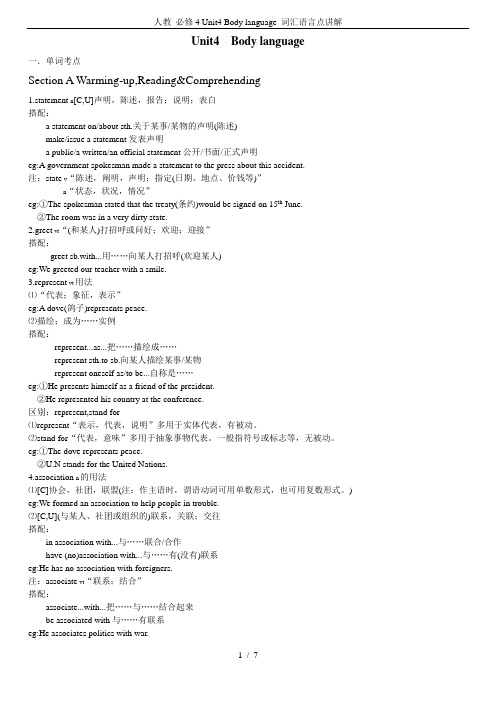
Unit4 Body language一.单词考点Section A Warming-up,Reading&Comprehending1.statement n[C,U]声明,陈述,报告;说明;表白搭配:a statement on/about sth.关于某事/某物的声明(陈述)make/issue a statement发表声明a public/a written/an official statement公开/书面/正式声明eg:A government spokesman made a statement to the press about this accident.注:state v“陈述,阐明,声明;指定(日期、地点、价钱等)”“状态,状况,情况”neg:①The spokesman stated that the treaty(条约)would be signed on 15th June.②The room was in a very dirty state.2.greet vt“(和某人)打招呼或问好;欢迎;迎接”搭配:greet sb.with...用……向某人打招呼(欢迎某人)eg:We greeted our teacher with a smile.3.represent vt用法⑴“代表;象征,表示”eg:A dove(鸽子)represents peace.⑵描绘;成为……实例搭配:represent...as...把……描绘成……represent sth.to sb.向某人描绘某事/某物represent oneself as/to be...自称是……eg:①He presents himself as a friend of the president.②He represented his country at the conference.区别:represent,stand for⑴represent“表示,代表,说明”多用于实体代表,有被动。
高一英语新人教选择性必修一 知识点盘点 Unit 4

高一英语新人教选择性必修一知识点盘点 Unit 4Unit 4 Body LanguagePart A Key Vocabulary1.Vary (v.): to change or alter according to the XXX.Usage: XXX。
XXX。
Vary with。
n: us (adj.)。
Varied (adj.)。
Variety (n.)。
Variable (adj.)2.Witness (v./n.): to see or observe something happening。
a person who XXX.Usage: Be a witness to something。
Bear/give witness to something.3.Employ (v.): to use or apply。
to hire.n: Employer (n.)。
Employee (n.)。
Employment (n.)。
XXX (n.)Usage: XXX。
XXX to do。
Be employed in (doing) something.4.Approve (v.): XXX.Usage: Approve of。
Approve of (sb./sb.'s) doing something.XXX: XXX/disagreementn: Approval (n.)。
Disapprove (v.)5.Differ (v.): to be different or dissimilar to something.Usage: Differ from。
Differ in。
Differ with XXX).n: Difference (n.)。
Different (adj.)6.Favor (v./n.): to prefer or choose。
an act of XXX.Usage: XXX。
人教必修四Unit4_Body_Language_Words_And_Expressions

选词填空
①这事多半如此,不仅仅是可能。 probable , not only possible . It’s________
②上午九点半左右有人在大门口要见我,有 可能吗? Will it be ________ possible for someone to meet me at the gate about 9:30 a.m. ? ③第三,你必须把房子盖得尽可能结实些。 Third, you must make the houses as strong possible . as _________
approach n. ①靠近; 临近; 接近
我们听见火车开过来了。
We heard the approach of the train.
n. ②方法; 步骤; 通路; 通道
The best approach to learning a foreign language
is the study of the spoken language.
His English improved enormously because of his association with British people. 因为他和英国人有来往, 所以他的英语突飞 猛进。 【拓展】 associate [ə'səuʃieit] v. associate… with…把……联系起来; 由…… 联想到;和…交往 in association with 与……联合; 与……有关联
5. major adj.主要的,重要的;较大的 n.主修科目;v.主修 1) The play was a major success.
这出戏大获成功。
2) My major is French.
2019新人教高中英语选择性必修一Unit4BodyLanguage单元词汇课件

ap 靠近+ propri自己的+ate 形容词后缀→靠近自己,才知道什么是适合的
牛仔裤不适合正式聚会。 翻译: Jeans are not appropriate for a formal party.
相比之下,我最想嫁的男星是 杨迪。
By contrast, the actor I want to marry the most is Yangdi.
3. The children were dressed _i_d_e_n_t_ic_a_l_ly__(identical). 4. She is married to fellow journalist John Roberts and are proud parents of
_t_w_i_n_s__(twin). 5. Her evidence suggests a different _in_t_e_r_p_re_t_a_t_io_n_(interpret) of the events. 6. ①French __d_i_ff_e_rs___(differ) from English in this respect. ②There are no
2.They stood in silence with their heads __b_o_w_e_d___(bow). 3.The knives _w__e_re__b_e_nt__(bend) out of shape. 4.A teacher should be good at drawing _i_n_fe_r_e_n_ce_s__(infer) about other
Unemployment has been rising during the pandemic.
Unit+4+Body+Language+词汇练习 高中英语人教版(2019)选择性必修第一册

Unit 4LISTENING TO HOW BODIES TALK 早晚读词汇及中译英,英译中练习1.body language 肢体语言2.express thoughts and opinions表达思想和观点3.spoken language 口语4.make eye contact 进行眼神交流5.display interest 表现出兴趣6.demonstrate respect表示尊敬7.identical gesture 同样的手势8.have the opposite meaning有相反的含义16.have the same meaning 有相同的含义17.shake hands 握手18.nod the head点头19.shake one`s head 摇头20.get through difficult situations 度过难关21.feel down or lonely 感觉到沮丧或孤独22.smiling face笑脸9.be appropriate to 适合10.look into someone`s eyes 直视某人的眼睛11.by contrast 相比之下.23.look down 低头,向下看24.witness sb. doing sth.看到某人正在做某事12.avoid making this gesture避免做这个手势13.by comparison 相比之下14.break down barriers打破障碍15.make yourself happier and stronger让自己更快乐更强壮英译中1.body language2.express thoughts and opinions3.spoken language4.make eye contact5.display interest6.demonstrate respect7.identical gesture8.have the opposite meaning 14.have the same meaning15.shake hands16.nod the head17.shake one`s head18.get through difficult situations19.feel down or lonely20.smiling face9.be appropriate to10.look into someone`s eyes11.by contrast12.look down13.witness sb. doing sth.21.avoid making this gesture22.by comparison23.break down barriers24.make yourself happier and stronger中译英1.肢体语言2.表达思想和观点3.口语4.进行眼神交流5.表现出兴趣14.表示尊敬15.同样的手势16.有相反的含义17.有相同的含义18.握手6.点头7.摇头8.度过难关9.感觉到沮丧或孤独10.笑脸11.适合12.直视某人的眼睛13.相比之下19.低头,向下看20.看到某人正在做某事21.避免做这个手势22.相比之下23.打破障碍24.让自己更快乐更强壮。
人教版新教材选择性必修一单词表知识点讲解Unit 4 Body Language
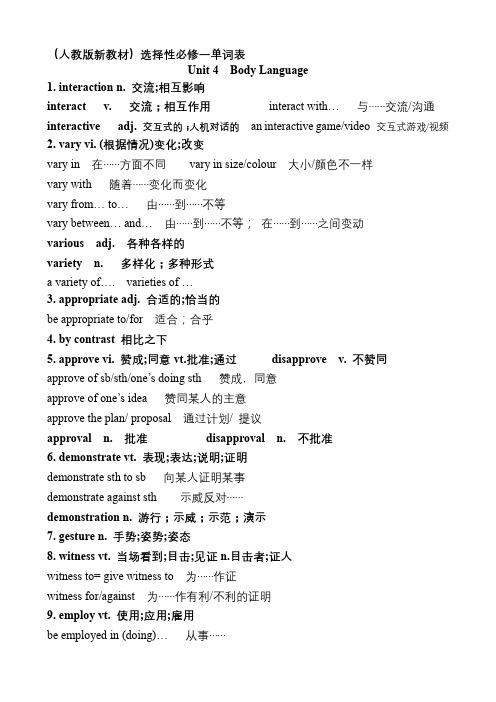
(人教版新教材)选择性必修一单词表Unit 4 Body Language1. interaction n. 交流;相互影响interact v. 交流;相互作用interact with… 与……交流/沟通interactive adj. 交互式的;人机对话的an interactive game/video 交互式游戏/视频2. vary vi. (根据情况)变化;改变vary in 在……方面不同vary in size/colour 大小/颜色不一样vary with 随着……变化而变化vary from… to… 由……到……不等vary between… and… 由……到……不等;在……到……之间变动various adj. 各种各样的variety n. 多样化;多种形式a variety of…. varieties of …3. appropriate adj. 合适的;恰当的be appropriate to/for 适合;合乎4. by contrast 相比之下5. approve vi. 赞成;同意vt.批准;通过disapprove v. 不赞同approve of sb/sth/one’s doing sth 赞成,同意approve of one’s idea 赞同某人的主意approve the plan/ proposal 通过计划/ 提议approval n. 批准disapproval n. 不批准6. demonstrate vt. 表现;表达;说明;证明demonstrate sth to sb 向某人证明某事demonstrate against sth 示威反对……demonstration n. 游行;示威;示范;演示7. gesture n. 手势;姿势;姿态8. witness vt. 当场看到;目击;见证n.目击者;证人witness to= give witness to 为……作证witness for/against 为……作有利/不利的证明9. employ vt. 使用;应用;雇用be employed in (doing)… 从事……be employed to do sth 被雇佣来做某事employ sb to do sth 雇佣某人做某事employ sb as … 雇佣某人为……employ oneself in 使忙于,使从事于employer n. 雇主employee n. 雇员employment n. 雇用unemployed adj. 失业的10. identical adj. 相同的be identical to/with… 与……相同/相似11. interpret vt. 把…理解(解释)为vi.&vt.口译interpret sth in … 用(语言或表演)解释某事interpret as 解释为……;把……理解为……interpret for sb 为某人做翻译interpretation n. 解释;翻译interpreter n. 口译者translate v. 翻译translator n. 笔译者12. differ vi. 相异;不同于differ from= be different from 与……不同differ in (size;age;colour)= be different in 在……方面不同different adj. 不同的 A be different from B in sthdifference n. 区别make a /no difference (to …) 对……有/没有影响或作用tell the difference between A and B 指出A和B的不同13. by comparison (与…)相比较in comparison with/to sth 与某物相比较compare v. 比较;对比;比喻n.比较compare…with… 把…和…比较compare…to… 把…比作…compared with/to (作状语) 与…相比Compared with/to other people, he is fortunate.beyond/without compare无与伦比;举世无双14. cheek n. 面频;脸频15. favour vt. 较喜欢;选择;有利于n.帮助;恩惠;赞同do sb a favour 帮助某人ask a favour (of sb) 找某人帮忙in favour of 支持;赞同in one’s favour 有利于某人Fortune favours the brave. 天佑勇者favourable adj. 给人好印象的;赞同的favourably adv. 顺利地;有利地;赞成地favourite adj. 最喜爱的16. bow vi. 鞠躬;点头v.低(头) n.弓;蝴蝶结17. waist n. 腰;腰部 a slim waist 纤纤细腰18. make inferences 推理;推断by inference 由此推断make a difference 有作用;有影响19. break down 消除;分解;打破20. barrier n. 隔阅;障碍a natural barrier to … ……的天然屏障21. fake adj 假装的;假的;冒充的 a fake $20 bill 一张20美元假钞22. anger n. 愤怒;怒气vt.使生气;激怒23. reliable adj. 可靠的;可信赖的dependable adj. 可靠的;可信赖的rely v. 信任;信赖rely on 依靠;依赖reliability n. 可靠24. incident n. 发生的事情;严重事件;冲突25. trial n.&v.审讯;审判;试验;试用on trial 受审判;在试验中trial and error 反复试验;不断摸索26. slight adj. 轻微的;略微的;细小的27. slightly adv. 略微;稍微28. twin adj. 双胞胎之一的;孪生之一的n.生之一;双胞胎之一29. nonverbal adj. 不涉及言语的;非言语的30. assessment n. 评价;评定make assessments 作出评价31. assess vt. 评估;评价be assessed as… 被判定为……assess the impact of… 评价……的影响32. internal adj. 内部的;里面的33. straighten up 直起来;整理;收拾整齐straighten out 解决(问题);整顿(混乱情况)34. slump v. 垂头弯腰地走(或坐等)35. pose n. 故作姿态;(为画像、拍照等摆的)姿势strike a pose 摆出姿势vi.摆好姿势vt.造成(威胁、问题等)pose a question 提出问题pose for.. 为……摆好姿势pose for a photographpose… to/for…对……产生……pose as… 冒充成……pose a threat/challenge/danger/risk to… 对……构成威胁/挑战/危险/风险strike a pose 摆出某种姿势36. bend vt.&v.(bent, bent)(使)弯曲;倾斜;偏向bend over/down 弯腰;附身bend one’s mind/efforts to… 把心思集中到……上bend to one’s will 顺从某人的意志sharp bend 急转弯37. reveal vt. 揭示;显示;露出reveal sth to sb 向某人泄露某事it is revealed that… 据透露……38. clarify vt. 使更清晰易懂;阐明;澄清clarify a situation/ problem/ issue/stand 阐明情况/问题/论点/立场clarify air 净化空气clarified adj. 纯净的clarified water 纯净水clarification n. 阐明;澄清;净化;(通过加热等的)提炼,净化; seek clarification of 寻求澄清39. in other words 换句话说;也就是说40. educator n. 教师;教育工作者;教育家41. tick vt. 给(试卷、问题等)打钩号vi.(钟表)发出嘀嗒声n.钩号42. tendency n. 趋势;倾向a tendency to do sth 做某事的倾向tend v. 易于; 往往;倾向于; 照料, 看管tend to do sth 往往会......; 倾向于做某事tend to the sick 照料病人trend n. 趋势;动向on trend 流行的43. lower vt. 把…放低;降低;减少adj下面的;下方的;较小的44. imply vt. 意味着;暗示at the name implies 顾名思义implication n. 暗示;影响;后果by implication 言下之意45. barely adv. 几乎不;勉强才能;刚刚barely…when… 表示“一……就……”46. chin n. 下巴with one’d chin on one’s hand 用手托着下巴47. occupy vt. 占据;占用occupy oneself with sth/in doing sth 忙于某事;专心于做某事occupied adj. 没空的;忙碌的keep sb occupied 使某人忙碌be occupied in/with (doing sth) 忙于做某事occupier n. 占用者;居住者occupation n. 占用;职业48. stare vi. 盯着看;凝视n.凝视stare at盯;凝视stare up at 抬头凝视stare sb in the face 凝视某人的脸stare sb down 盯着某人不敢再对视49. ceiling n. 天花板;上限50. distract vt. 分散(注意力);使分心distract one’s attention 分散某人的注意力distract sb/sth from sth 转移(注意力);分散(思想);使分心be distracted from sth 转移对某物的注意力distracting adj. 令人分心的;使人思想不集中的distraction n. 分散注意力的事51. perceive vt. 察觉;看待;理解perceive sth/sb as… 把某人/某事看作……perception n. 知觉;洞察力52. distinguish vi.&vt.区分;辨别distinguish between A and B =distinguish A from B 辨别区分A和B distinguish oneself 显扬自己;使自己出名distinguished adj. 杰出的;著名的be distinguished for/as 因/作为……而出名53. anxiety n. 焦虑;担心;害怕in anxiety 担忧着;挂念着anxiety about/over…担心……anxious adj. 焦虑的; 担心的be anxious about sth for sb 为某人担忧某事be anxious to do sth 做某事很焦虑54. chest n. 胸部;胸55. embarrassed adj. 难堪的;尬的feel/be embarrassed about/at… 对……感到尴尬feel/be embarrassed to do sth 对做某事感到尴尬embarrass v. 使尴尬embarrassing adj. 令人尴尬的embarrassment n.尴尬to one’s embarrassment 令某人尴尬的是56. ashamed adj. 羞愧;惭愧be ashamed of (doing) sth 以某事感到羞愧be ashamed to do sth 以做某事为耻be ashamed of oneself for 为…而害羞feel ashamed for sb 替某人感到羞愧not merely=rather than merely 不仅仅58. call on (短暂地)访问;要求(某人讲话等);正式邀请call back 回电话call in 召集;请来call by 顺路拜访call on sb. 拜访某人call at sp. 参观某地call for 要求;需要;提倡;号召call off 取消;撤销call up 征召入伍;打电话;呼唤出59. bother vi.&vt.费心;麻烦;因…操心;麻烦;不便bother sb with/ about sth 给...造成麻烦,痛苦使...烦恼,担忧bother to do bother doing 花费时间精力做某事bother sb 打扰插话bother n. 麻烦困难(不可数)---Thanks for your help. --- it was no bother.put sb. to botherget sb. /oneself into bother给某人添麻烦60. weep vi.&vt.哭泣;流泪61. at work 有某种影响;在工作at play on duty on business 介词短语表正在进行或持续的动作62. conflict n. 矛盾;冲突vi.冲突;抵触come into conflict with 与……冲突;与……战斗conflict with 与……相冲突conflict over ……的冲突in conflict with sb 与某人的冲突conflict of interest(s) 利益冲突63. inquire vi.&vt. (or:enquire) 询问;打听形近的词:acquire v. 获得;取得;学到require v. 要求;需求inquiry /enquiry n. 询问;打听64. ultimately adv 最终;最后65. adjust vt. 调整;调节vi,&.适应;(使)习惯adjust …to… 使……适应……adjust to sth/doing sth 适应;适合adjust oneself to = adapt oneself to 使自己适应(to是介词)adjustment n. 调整;调节make an adjustment to… 对……作出调整66. intervene vi. 干预;介入67. react vi. (对…)起反应;回应;(对食物等)有不良反应react to 对……作出反应react on/upon 对……有影响react with 与……起反应(多指化学反应)react against 反对;对抗reaction n. 反应;反作用;对抗reactive adj. 反应的;回应的interact v. 相互作用68. component n. 组成部分;零件69. tone n. 语气;腔调;口吻70. Brazil 巴西(国家名)71. Bulgaria 保加利亚(国家名)72. Albania 阿尔巴尼亚(国家名)。
